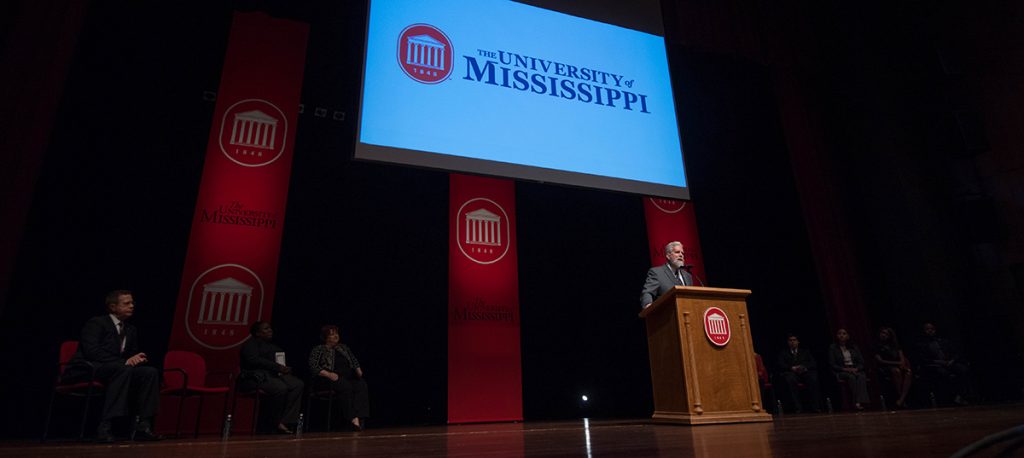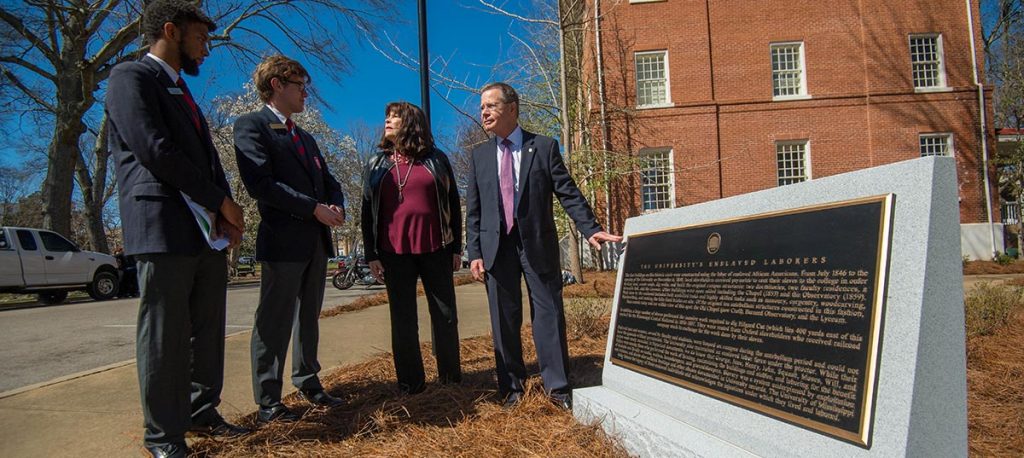Welcome and Remarks at History and Context Plaques Unveiling Ceremony
Friday, March 2, 2018, 11 a.m.
Gertrude C. Ford Center for the Performing Arts
Welcome! We’re so glad all of you have joined us today to celebrate this important milestone in the life of our great university and to mark the culmination of the tremendous work from the Chancellor’s Advisory Committee on History and Context. It’s especially rewarding to be here to witness the tangible results from this deliberate, thoughtful, and academically-focused endeavor.
First, I would like to convey my profound thanks to the members of the committee for their exceptional work on this challenging, but very important task for our university. I would also like to recognize the members of the Planning Committee for this event. You have done an extraordinary job of coordinating and implementing today’s event! We truly appreciate all the energy, effort, and thoughtfulness you poured into making this ceremony a wonderful celebration for our campus community.
If you recall, I established the CACHC to address Recommendation 5 of the 2014 action plan, which urged the university to “offer more history, putting the past into context” and to do so “without attempts to erase history, even some difficult history.” As Mississippi’s flagship university, we have long been committed to honest and open dialogue about our history. The work of the CACHC represents that commitment in action — informed by expertise and conducted with respectful candor.
It is not always easy to recognize significant moments while we are in those moments. It can be challenging to tell the story of change and transformation while we are going through it. But we are here today to recognize that this work indeed is a significant moment of change and transformation in the history of our university. And we’re here to honor this moment by sharing our story broadly and in a forthright manner through the six contextualization plaques we’re unveiling today.
In my letter from July 6 last summer to our university community, I shared the CACHC’s final report and the recommendations we would implement including plaques to contextualize Longstreet Hall, George Hall, Lamar Hall, Barnard Observatory, the Tiffany Stained Glass Window in Ventress Hall, and a plaque noting the contributions of enslaved laborers. These plaques are daily reminders of our obligation to learn from the past and commit to an inclusive future. We are especially honored to have student ambassadors here with us today who will share the powerful words from these plaques a little later in the ceremony.
In addition to the six contextualization plaques, we have the remaining tasks to finalize:
- We will seek to rename Vardaman Hall after its renovation is complete in a few years.
- We will clarify that Johnson Commons is named after Paul B. Johnson Sr., by adding “Sr.” to the building name.
- And we have the University Cemetery and a related memorial, for which we will be adding individual gravestones to recognize the sacrifice of each person known to be buried there as well as a marker in an appropriate location to recognize the African American men from Lafayette County who served in the Civil War in the U.S. Colored Troops.
As an educational institution, we have a responsibility to teach and foster learning, especially from parts of our history that are painful. All these outcomes emanating from the CACHC process remind us that to move forward as a community, we must neither hide from nor hide the problems of our past.
It is now my honor to introduce our keynote speaker, Dr. John Neff, associate professor of history and director of the Center for Civil War Research. Upon completion of his Ph.D. from the University of California, Riverside, Dr. Neff joined the UM faculty in 1999 with a research and teaching focus in Civil War memory. In 2005, he published his first book titled Honoring the Civil War Dead: Commemoration and the Problem of Reconciliation.
Dr. Neff has been widely recognized for his teaching excellence. In 2005, he was named the College of Liberal Arts Teacher of the Year. And in 2009, he received the Elsie B. Hood Outstanding Teacher Award.
Along with Associate Director Dr. April Holm, as director of the Center for Civil War Research, Dr. Neff is responsible for hosting the Annual Conference on the Civil War, awarding the Wiley-Silver prize for the best book published on the Civil War era, and organizing the Burnham Lecture, which brings distinguished scholars of the Civil War era to campus to share their work.
Especially notable for today’s ceremony, Dr. Neff served as a member of the Chancellor’s Advisory Committee on History and Context as well as the Planning Committee responsible for today’s event. Dr. Neff, we really appreciate your service on both these committees, and we are so pleased to have you as our keynote speaker. Please help me in welcoming Dr. Neff.


